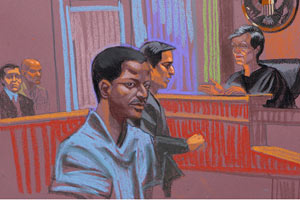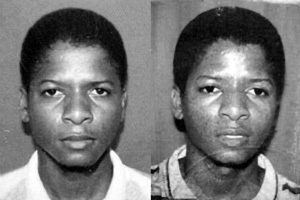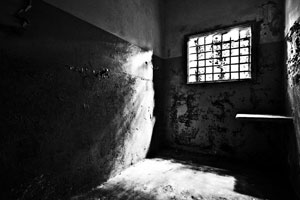
Shen Hong/Xinhua/Zumapress.com
Read Karen Greenberg’s previous coverage of the trial of Ahmed Khalfan Ghailani, the first Guantanamo detainee to be tried in a civilian court.
For two and a half days, the jury in the trial of Ahmed Ghailani, the Tanzanian alleged to have been involved in the embassy bombings plot of 1998, has deliberated. And though a few days are clearly insufficient to review 2000-plus pages of testimony and thousands of stipulations of fact between the parties, there has been a push for a speedy decision in this, the first and perhaps only Guantanamo trial to come to federal court. As the deliberations began, Judge Lewis Kaplan addressed the need for efficiency. “I may well ask you to work later [in the day] if we go beyond this week,” he told the jury. And Monday morning, he informed the jury that henceforth they should expect to deliberate until 5:30—one hour later than their usual.
This sense of urgency is perfectly in keeping with the rapid pace of the entire proceeding, which concluded months ahead of schedule. All the parties seemed to concur: the tighter the trial, the better. Even before the trial began, the prosecution chose to forgo an appeal over the loss of their main witness, L’Housseine Abebe, citing among other things that fact that “an appeal at this juncture would obviously cause a delay [of] perhaps significant, length.” Likewise, in the final days, the defense agreed to use stipulations in lieu of witnesses they might have called.
During the three days of deliberations, a sense of imminent expectation has lain over the courtroom and the foyer outside, where those awaiting the verdict go to read newspapers or to drink coffee or water, all of which are still banned from the courtroom. Hour after hour, the suspense has built. Sketch artists appeared on Thursday and again on Monday, drawing their last portraits of the defense table, asking the lawyers where everyone would most likely be positioned when the verdict was delivered. The attorneys for both sides have stayed near the courtroom at the request of Judge Lewis Kaplan, while the defendant—dressed in his standard button-down shirt—remained in a back room.
There is much speculation about the jury’s discussions. But here’s what we know.
On Wednesday and Thursday, the jury made it clear that it was considering the evidence in some detail. Within an hour of beginning deliberations, the jury sent its first note to the judge, asking for transcripts from the testimony of three Tanzanian witnesses. On Thursday, the jury requested information about the forensic centerpiece of the trial, two FBI searches of the defendant’s home. FBI witnesses had testified that a detonator was found during the second search, but not the first.
These were legitimate and expectable notes from a jury. On Monday, however, something unexpected occurred. Juror No. 12, a female juror who has paid unwavering attention to every moment of this trial—so much so that a couple of observers questioned whether she was in fact the lawyer on the jury (there is one, and she is not)—let it be known that she wanted to be removed from the jury. “My conclusion,” she wrote , “it not going to change.” “I feel I am in attack,” she wrote and asked whether she could be excused or exchanged. The defense requested a mistrial while the prosecution asked the judge to meet privately with the juror. Judge Kaplan dismissed both options, re-read the jury the portions of his instructions reminding them to stick to their “honest convictions” and “good conscience.” Six and a half hours later, the jurors went home, still with no verdict.
Compared to other terrorism cases, this decision is not taking particularly long. In the first embassy bombings trial, back in 2001, it took 12 days to reach a verdict. Trials over the plots to blow up JFK airport and to attack Fort Dix with weapons resulted in five days and six days of deliberations, respectively, And most recently, in the case of the attempt to blow up a synagogue in the Bronx, the conviction only came down after eight days.
Likely, a verdict is not far away. But with each hour that passes, the normalcy of the legal process restores a sense of reason and balance to the nation’s approach to terrorism. With each hour that passes, we are reminded that charge and conviction, guilt and innocence, are there to be deliberated, especially in a case where “reasonable doubt” was argued and where 285 separate counts of conspiracy and murder are at issue.
For each night that a jury is truly asking questions about the facts of the case, America takes a step forward, away from the unthinking presumption that the mere charge of terrorism is enough. As Judge Kaplan told the courtroom, “Let’s just see what happens.”
Special thanks to Jonathen DeYoung for his help on this post.













